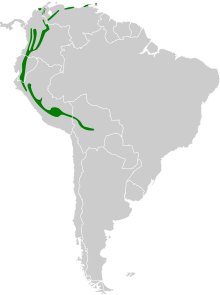The blue-capped tanager (Sporathraupis cyanocephala) is a species of bird in the tanager family Thraupidae. It was formerly placed in the genus Thraupis but is now the only species in the genus Sporathraupis.
| Blue-capped tanager | |
|---|---|

| |
| In El Ávila National Park, Caracas, Venezuela | |
| Scientific classification | |
| Domain: | Eukaryota |
| Kingdom: | Animalia |
| Phylum: | Chordata |
| Class: | Aves |
| Order: | Passeriformes |
| Family: | Thraupidae |
| Genus: | Sporathraupis Ridgway, 1898 |
| Species: | S. cyanocephala
|
| Binomial name | |
| Sporathraupis cyanocephala (D'Orbigny & Lafresnaye, 1837)
| |

| |
| Synonyms | |
|
Aglaia cyanocephala (protonym) | |
It is found in Bolivia, Colombia, Ecuador, Peru, Trinidad and Tobago, and Venezuela. Its natural habitats are subtropical or tropical moist montane forests and heavily degraded former forest.
Taxonomy
editThe blue-capped tanager was formally described in 1837 by the French naturalists Alcide d'Orbigny and Frédéric de Lafresnaye from a specimen collected in the Bolivian Yungas. They coined the binomial name Aglaia cyanocephala.[2][3] The species was usually placed in the genus Thraupis but when a molecular phylogenetic study published in 2014 found that it was not closely related to other members of Thraupis, it was moved to the resurrected genus Sporathraupis that had been erected in 1898 by Robert Ridgway with the blue-capped tanager as the type species.[4][5][6] The genus name Sporathraupis combines the Ancient Greek spora meaning "seed" with thraupis, the word for an unknown small bird. The specific epithet combines the Ancient Greek kuanos meaning "dark blue" with -kephalos meaning "-headed".[7]
Eight subspecies are recognised:[8]
- S. c. cyanocephala (d'Orbigny & Lafresnaye, 1837) – Ecuador, Peru and north Bolivia
- S. c. annectens (Zimmer, JT, 1944) – central, west Colombia
- S. c. auricrissa (Sclater, PL, 1856) – northeast Colombia and northwest Venezuela
- S. c. margaritae Chapman, 1912 – north Colombia
- S. c. hypophaea Todd, 1917 – northwest to north-central Venezuela
- S. c. olivicyanea (Lafresnaye, 1843) – north-central Venezuela
- S. c. subcinerea (Sclater, PL, 1861) – north-central to northeast Venezuela
- S. c. buesingi Hellmayr & Seilern, 1913 – extreme northeast Venezuela and Trinidad
References
edit- ^ BirdLife International (2018). "Sporathraupis cyanocephala". IUCN Red List of Threatened Species. 2018: e.T22722549A132155620. doi:10.2305/IUCN.UK.2018-2.RLTS.T22722549A132155620.en. Retrieved 12 November 2021.
- ^ d'Orbigny, Alcide; Lafresnaye, Frédéric de (1837). "Synopsis avium". Magasin de Zoologie (in Latin). 7 (2): 1–88 [32].
- ^ Paynter, Raymond A. Jr, ed. (1970). Check-List of Birds of the World. Vol. 13. Cambridge, Massachusetts: Museum of Comparative Zoology. p. 324.
- ^ Ridgway, Robert (1898). "General Notes". Auk. 15: 330–333 [331]. doi:10.2307/4068573. JSTOR 4068573.
- ^ Burns, K.J.; Shultz, A.J.; Title, P.O.; Mason, N.A.; Barker, F.K.; Klicka, J.; Lanyon, S.M.; Lovette, I.J. (2014). "Phylogenetics and diversification of tanagers (Passeriformes: Thraupidae), the largest radiation of Neotropical songbirds". Molecular Phylogenetics and Evolution. 75: 41–77. doi:10.1016/j.ympev.2014.02.006. PMID 24583021.
- ^ Burns, K.J.; Unitt, P.; Mason, N.A. (2016). "A genus-level classification of the family Thraupidae (Class Aves: Order Passeriformes)". Zootaxa. 4088 (3): 329–354. doi:10.11646/zootaxa.4088.3.2. PMID 27394344.
- ^ Jobling, James A. (2010). The Helm Dictionary of Scientific Bird Names. London: Christopher Helm. pp. 126, 363. ISBN 978-1-4081-2501-4.
- ^ Gill, Frank; Donsker, David; Rasmussen, Pamela, eds. (July 2020). "Tanagers and allies". IOC World Bird List Version 10.2. International Ornithologists' Union. Retrieved 20 October 2020.
External links
edit
